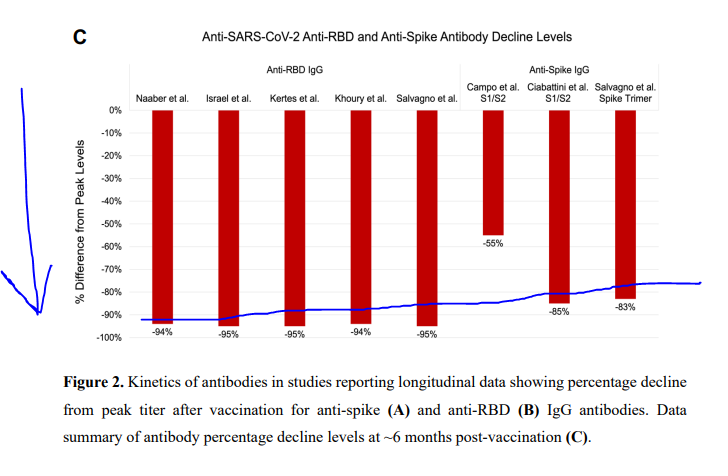
Abstract
Accumulating evidence shows a progressive decline in the efficacy of coronavirus disease 2019 (COVID-19) mRNA vaccines such as Pfizer-BioNTech (mRNA BNT161b2) and Moderna (mRNA-1273) in preventing breakthrough infections due to diminishing humoral immunity over time. Thus, this review characterizes the kinetics of anti-SARS-CoV-2 (Severe Acute Respiratory Syndrome Coronavirus 2) antibodies after the second dose of a primary cycle of COVID-19 mRNA vaccination. A systematic search of literature was performed and a total of 18 studies (N=15,980) were identified and reviewed. The percent difference of means of reported antibody titers were then calculated to determine the decline in humoral response after the peak levels post-vaccination. Findings revealed that the peak humoral response was reached at 21-28 days after the second dose, after which serum levels progressively diminished at 4-6 months post-vaccination. Additionally, results showed that regardless of age, sex, serostatus and presence of comorbidities, longitudinal data reporting antibody measurement exhibited a decline of both anti-receptor binding domain (RBD) IgG and anti-spike IgG, ranging from 94-95% at 90-180 days and 55-85% at 140-160 days, respectively, after the peak antibody response. This suggests that the rate of antibody decline may be independent of patient-related factors and peak antibody titers but mainly a function of time and antibody class/molecular target. Hence, this study highlights the necessity of more efficient vaccination strategies to provide booster administration in attenuating the effects of waning immunity, especially in the appearance of new variants of concerns (VoCs).
Competing Interest Statement
The authors have declared no competing interest.
Funding Statement
This study did not receive any funding.
Author Declarations
I confirm all relevant ethical guidelines have been followed, and any necessary IRB and/or ethics committee approvals have been obtained.
Yes
I confirm that all necessary patient/participant consent has been obtained and the appropriate institutional forms have been archived, and that any patient/participant/sample identifiers included were not known to anyone (e.g., hospital staff, patients or participants themselves) outside the research group so cannot be used to identify individuals.
Yes
I understand that all clinical trials and any other prospective interventional studies must be registered with an ICMJE-approved registry, such as ClinicalTrials.gov. I confirm that any such study reported in the manuscript has been registered and the trial registration ID is provided (note: if posting a prospective study registered retrospectively, please provide a statement in the trial ID field explaining why the study was not registered in advance).
Yes
I have followed all appropriate research reporting guidelines and uploaded the relevant EQUATOR Network research reporting checklist(s) and other pertinent material as supplementary files, if applicable.
Yes
Paper in collection COVID-19 SARS-CoV-2 preprints from medRxiv and bioRxiv
